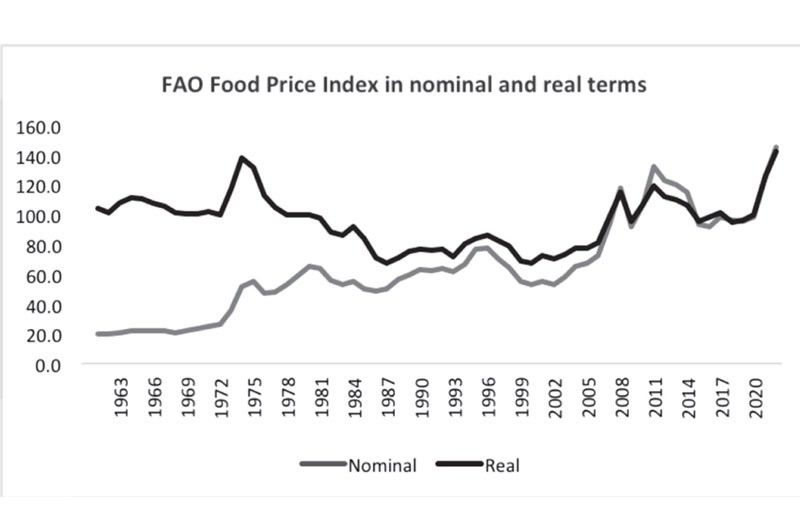Food shortage

A global food shortage is looming. Driven by surging energy costs, supply disruptions, and escalating war between two of the world’s major breadbaskets, food prices worldwide are surging to record levels, compounding food security concerns and making access to food more difficult.
In Peru, farmers are protesting a shortage of fertilizers estimated to decrease corn, potato, and rice production by 40 percent. In Sri Lanka, people are lining up at government-run “fair-price” shops to buy essential commodities such as rice, dal, milk, and flour because prices in private groceries are three to four times higher. In the meantime, Sri Lanka elected to default on its debt to pay for imports of essential goods like food, fuel, and medicines.
Even the fast-food chain McDonald’s has suffered from shipment delays and a shortage of potatoes used to make its famous French fries. The company has been rationing its fries in countries like Japan, Taiwan, Malaysia, and Indonesia since late 2021. Last week, McDonald’s Philippines announced it would only offer regular size fries, halting the sales of its large-sized portions.
Food prices at all-time high
According to the UN Food and Agriculture Organization (FAO), food prices today are higher than during the Arab Spring uprising in the early 2010s. As a result, food prices are now at new all-time high in nominal and real terms, surpassing even the prices reached during the 1973-74 Arab oil embargo. The basket of food items that make up the FAO Food Price Index shows year-on-year price increases of +37 percent for cereals, +23.6 percent for dairy products, +56 percent for vegetable oils, +22.6 percent for sugar, and +19 percent for meat.

Indonesia bans palm oil exports
Last Friday, Indonesia – the world’s top palm oil producer – announced plans to ban exports of the most widely used vegetable oil. Indonesia’s finance minister said that this would hurt other countries, but is necessary to ensure that cooking oil in the domestic market remains abundant and affordable. Palm oil is also used in cakes, chocolates, margarine, and biscuits, as well as cosmetics, detergents, and biofuels. This will worsen the vegetable oil shortage and raise food prices even more.
Ukraine – breadbasket of Europe
Even before the war, agricultural commodities climbed higher due to supply-chain disruptions and high energy costs. However, Russia’s invasion of Ukraine exacerbated the pre-existing price and global food supply pressures. UN FAO estimates that 1/3 of Ukraine’s farmlands will not be harvested or planted this year as the war escalates.
Ukraine is among the world’s top agricultural producers and is known as the breadbasket of Europe. It accounts for nine percent of the world’s wheat, 12 percent of maize and barley, and 50 percent of sunflower oil exports. Moreover, the ravaged Ukrainian farmlands and damaged infrastructure like highways, rail systems, bridges, and ports will make exporting crops more difficult.
Record high fertilizer prices
Another major reason for the food shortage is record high fertilizer prices. According to the US Department of Agriculture, fertilizer constitutes around 36 percent of a farmer’s operating costs for corn and 35 percent for wheat. Note that Russia and Belarus are top exporters of fertilizers, accounting for 37 percent of global potassium exports, 14 percent of phosphate, and 16.5 percent of nitrogen exports. However, Western sanctions have made Russian and Belarusian fertilizers expensive and harder to import. As a result, CRU Group’s fertilizer index recently reached a new record high at 390, well above the 360 record-high set in 2008 and quadruple the level it was at the beginning of 2021.
Rising production, transportation costs
The increase in energy prices and transportation costs also drives food prices higher. One-third of food costs are energy-related, while two-thirds of the cost of nitrogen fertilizers comes from gas. Fuel also accounts for around 30 percent of the expenses for aviation companies and 50 percent of the costs for shipping companies. The rerouting of trading in Europe plus the high war-risk premium also increased transportation costs for cargo ships and tankers transiting the Black Sea.
China lockdowns
Bloomberg News reported that China’s oil demand would fall 20 percent in April, the most since the Wuhan lockdown. The lockdown in major cities reduces fuel consumption and lessens food demand. However, the lockdowns disrupted the Chinese planting season as villages were sealed off as part due of the COVID curbs. As a result, a third of the farmers in the Jilin, Liaoning, and Heilongjiang provinces, which account for 20 percent of China’s grain production, cannot get fertilizer and seeds kept inside cargo holds in Shanghai.
Rice production to plunge 10%
Unlike wheat and corn, which have seen supplies cut off from one of the world’s major breadbaskets, the global supply of rice has been relatively stable. However, the International Rice Research Institute (IRRI) warned that harvests could plunge 10 percent next season as fertilizer supply remains curtailed. Faced with high input prices, farmers will use less fertilizer to save costs, reducing future rice yields and further complicating the food supply shock on the global market.
Philequity Management is the fund manager of the leading mutual funds in the Philippines. Visit www.philequity.net to learn more about Philequity’s managed funds or to view previous articles. For inquiries or to send feedback, please call (02) 8250-8700 or email [email protected].
- Latest
- Trending


























